Address any questions or comments regarding this newsletter to the individual authors listed after each article or to its editors, Nathan Johanning, 618-939-3434, njohann@illinois.edu or Bronwyn Aly 618-695-6060, baly@illinois.edu. The Illinois Fruit and Vegetable News is available on the web at: http://ipm.illinois.edu/ifvn/. To receive or be removed from email notification of new postings of this newsletter, contact Nathan Johanning or Bronwyn Aly at the phone numbers or email addresses above.
In This Issue:
Upcoming programs (listings for beginning and established growers)
News & Announcements (Copyrights/Trademarks Reminder for Corn Mazes)
Regional Reports (St. Louis Metro East, southern Illinois, Dixon Springs)
Fruit and Vegetable Pest Management (New Videos on Late Season Insect Scouting and Fruit Set in Pumpkins, Reminder-Expanded Indemnified 24(c) Special Local Need Label for Dual Magnum for Illinois Growers Includes Use Under Plastic in Strawberries)
Upcoming programs
See the University of Illinois Extension Local Food Systems and Small Farms Team’s website at:
http://web.extension.illinois.edu/smallfarm/ and the calendar of events at http://web.extension.illinois.edu/units/calendar.cfm?UnitID=629.
- Ogle County Farm Stroll, Sunday, September 8, 2019 from 12p.m.-5p.m. Free self-paced tours of diversified family farms. https://web.extension.illinois.edu/units/event.cfm?EventID=81661&UnitID=463
- Midwest Mechanical Weed Control Field Day, Wednesday September 18, 2019 from 8:30a.m.-4:30p.m. Learn the principles and tools for precise mechanical weed control from farmers and industry experts. Gwenyn Hill Farm W294 N130 Bryn Dr. Waukesha, WI 53188 https://thelandconnection.org/event/mechanicalweedcontrol2019/
- Guiding Farmers to Legal Resilience, Farm Common's workshop, Thursday September 19th, 2019 at the McLean County Farm Bureau Building in Bloomington. FREE full-day interactive farm law training workshop for agricultural service providers in Illinois. We invite you to join us for this day of farm law learning! For more info + to register, click here.
- Boone County Farm Stroll, Sunday, October 6, 2019 from 12 p.m.-5 p.m. Free self-paced tours of diversified family farms. https://web.extension.illinois.edu/units/event.cfm?EventID=81622&UnitID=463
- 2020 Illinois Specialty Crops Conference, January 8-10, 2020, Springfield, IL. Save the date!!!! https://www.specialtygrowers.org/2020-save-the-date . More information to follow later in the year but mark your calendars now and plan on attending the pre-conference workshops, conference programming, trade show, and annual association meetings!
- 2020 Southern Illinois Fruit and Vegetable School, Wednesday, February 5, 2020, Mt Vernon Doubletree Inn. This program includes separate tracks for small fruit, tree fruit and vegetable production. Save the date and more information to follow!
- 2020 Southwest Illinois Commercial Tree Fruit School, Tuesday, February 4, 2020 at the Knights of Columbus Hall just south of Hardin, IL. Save the date and more information to follow!
News & Announcements
Copyrights/Trademarks Reminder for Corn Mazes
Corn Mazes are a great agritourism draw, but make sure you aren’t violating any copyrights or trademarks with your design. I can use Eckert’s new corn maze (at their Millstadt farm), honoring the St Louis Blues for their 2019 Stanley Cup win, as an example. This required agreements with not only the St Louis Blues organization, but also the National Hockey League for the use of the Stanley Cup image, even though all were in corn. Size of operation matters not, small to large. The web makes finding these violations very easy for patent lawyers, so make sure you avoid a cease and desist order, followed by other financial related unpleasantness.
Elizabeth Wahle (618-344-4230; wahle@illinois.edu)
Regional Reports
From the St. Louis Metro East… For most growers, the last of the peaches are just finishing up with Laurol, PF 35-007 Fat Lady and Autumnstar. Honeycrisp apple is finished and harvest has moved into the Jonathan and Pixie Crunch window. Golden Delicious will be up next. The primocane blackberry harvest is ongoing, moving out of the Prime-Ark Freedom window. Sweet corn, tomatoes and peppers slowing down and coming to a close for some growers. Early winter squash are making an entry into markets, ahead of pumpkins which should start in 2-3 weeks. The pumpkin crop still looks good. According to Dr. Babadoost, no confirmed reports of downy mildew in all of Illinois so far. If you want to be alerted to confirmed cases throughout the US, visit the Cucurbit Downy Mildew Forecasting website and sign up for alerts at http://cdm.ipmpipe.org/
Elizabeth Wahle (618-344-4230; wahle@illinois.edu)
From southern Illinois... Most of southern Illinois has been fairly dry the last two weeks. We haven’t had much of any rain in Murphysboro. Areas to the north did get some rain last Friday(8/30) afternoon and evening. At home on the farm south of Waterloo we got a much needed 1.5”, however, you didn’t have to go much further south and the rain tapered down to nothing. Generally, we have had highs in the 80s to around 90˚ with variable humidity day to day and lows in the 60s to 70s. We have had a few fronts pull through dropping the humidity a little for a day and more northernly winds, but then the southern flow would bring back a little more humid air. While it is hot, you can tell the heat doesn’t have the same intensity it did a month ago. The forecast has a slight break over the weekend, but then lots of sun and the low 90s for next week with limited rain chances.
Out in the field, vegetable harvest is slowing down, but when moisture has been moderate (not excessive or too little) late plantings are still doing well. In the orchard we are down to some of the very late peach varieties and in apples we are in to some of the Goldens and Jonathans. Powdery mildew has been showing up on pumpkins especially with the hot dry weather. Make sure you remain vigilant and scout for the disease presence and spread. Keep a good fungicide rotation especially through the next few weeks if you are seeing powdery mildew progress in your fields to maintain plant health for the later fruit set and fruit and stem quality on fruit. I have harvested a few fruit from my own pumpkins at home. Pie sized and many of the mini pumpkin gourds have ripe fruit. Other specialty type pumpkins and winter squash were just starting to have a few ripe fruit. On to in Jack O’Lanterns, Bayhorse Gold, Early Giant, and Magic Lantern were among the ones I had that did have a few ripe fruit. The weather forecast should push ripening and maturity of later fruit set.
Nathan Johanning (618-939-3434; njohann@illinois.edu)
From Dixon Springs Ag Center…
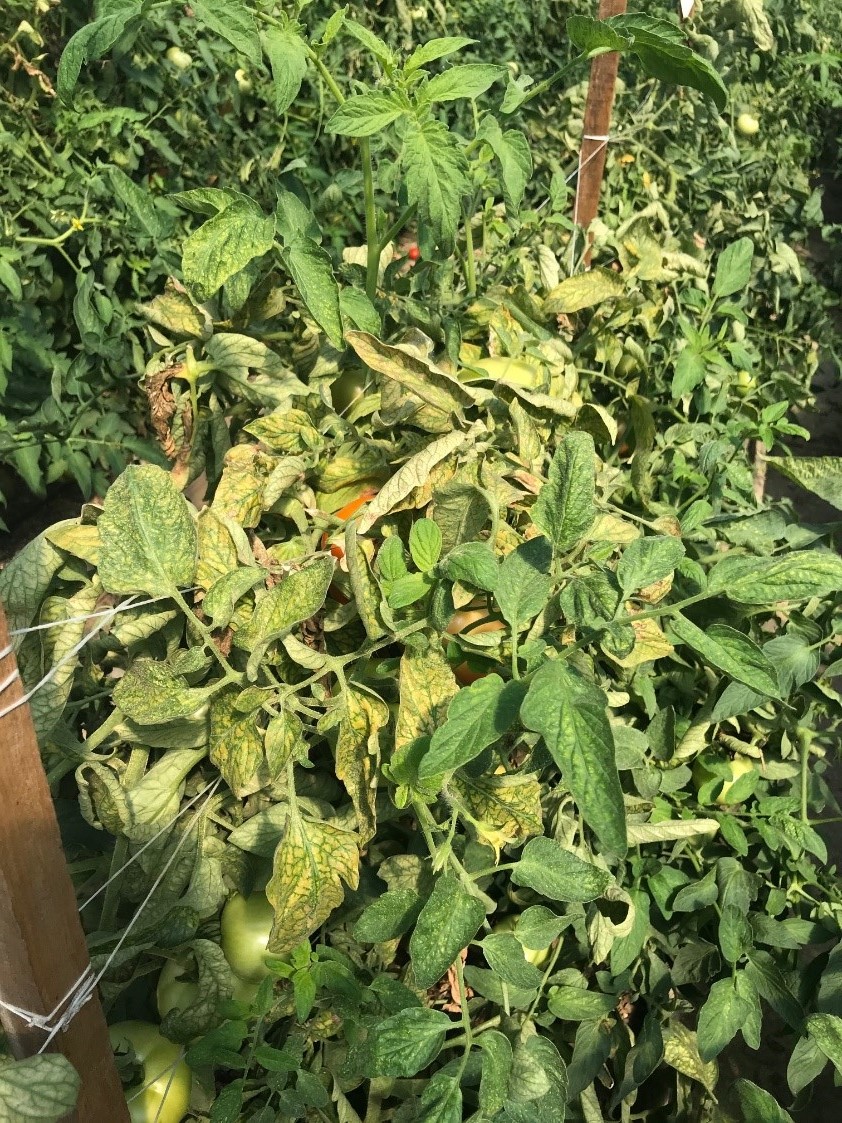
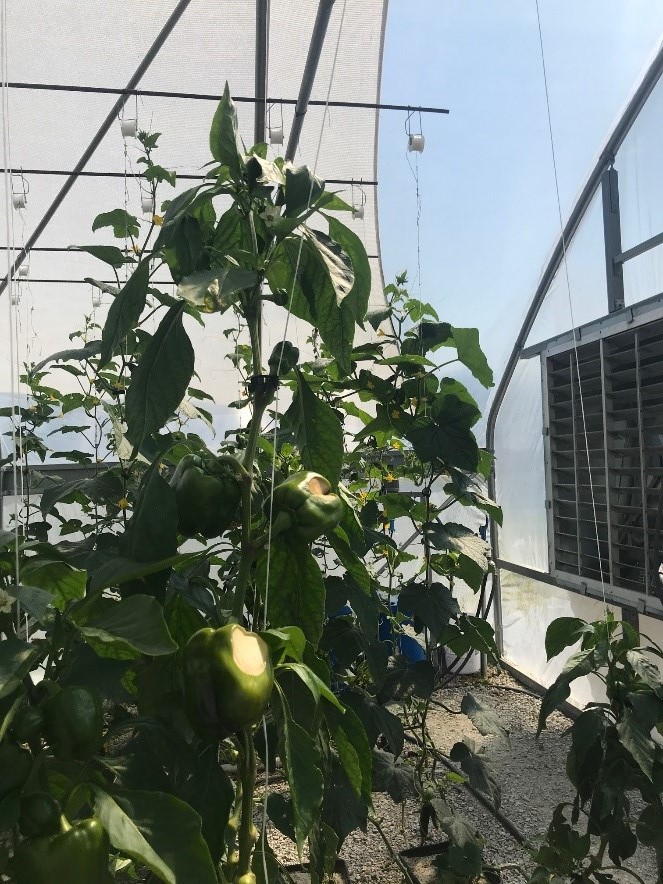
Spider mites on high tunnel tomatoes (left); sun scald on hydroponic pepper plants (right). Photos by B. Aly.
As we finish the first full week of September, temperatures are remaining quite hot and humid. We are continuing to see armyworm, aphids and spider mites in all of our high tunnels, but for the first time, spider mites are now on tomatoes in our raised ground bed tunnel. They have been present in the tunnel off and on throughout the season but had stayed on the cucumbers and eggplant only. From the picture above, the infected plants are displaying classic foliar symptoms of spider mites. The other picture above gives a good example of sun scald on peppers. A 50% shade cloth has been stretched over this tunnel since the first of June, but it does not quite extend all the way to the end of the tunnel. The position of the leaves on this particular plant are allowing direct exposure of the fruit to the sunlight. Plants adjacent to this one have better leave to fruit placement and have no signs of sun scald.
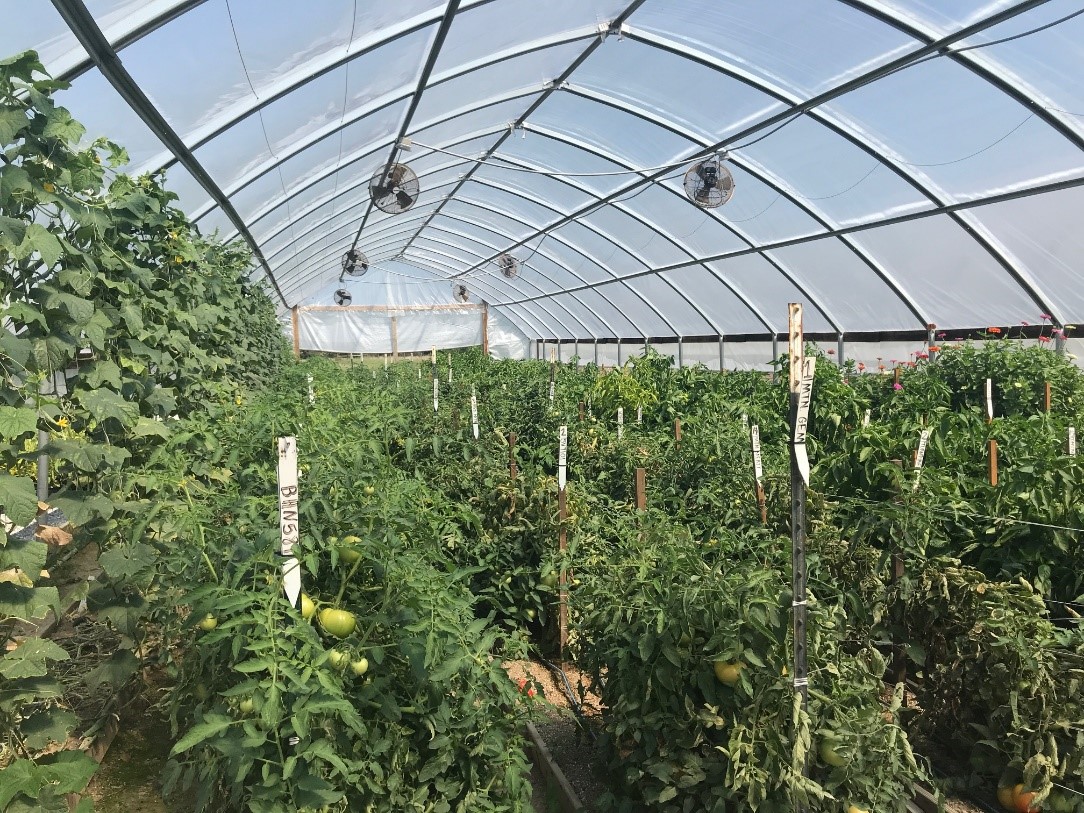
Raised ground bed high tunnel still producing lots of fruit at DSAC. Photo by B. Aly.
Despite various insect issues and early season disease problems, the plants in the raised ground bed high tunnel are still relatively healthy and continuing to set and ripen fruit. Fruit size and quality on tomatoes and peppers is still good but time will tell if we can get the newest, small green fruit to ripen as the day lengths continue to shorten.
The day neutral strawberry plants in the hydroponic vertical stacks started bearing significantly smaller, misshapen fruit so the plants received a “hair cut” and thinning. The majority of the plants not only had excessive foliar growth but had also set too many branch crowns, reducing air flow (leading to poor pollination) and fruit size. Once the foliage was trimmed away, branch crowns could be thinned down – starting with the removal of any dead or weak crowns. The picture below (left) is one week after the trimming, and already new flushes of leaves and flowers are visible. The picture below on the right was taken as we were working on the next planting of crops included in the high tunnel winter production grant. Drip irrigation is being set up in each of the beds and some of the plots will be planted onto black plastic mulch. Carrots from the first planting date are growing nicely.
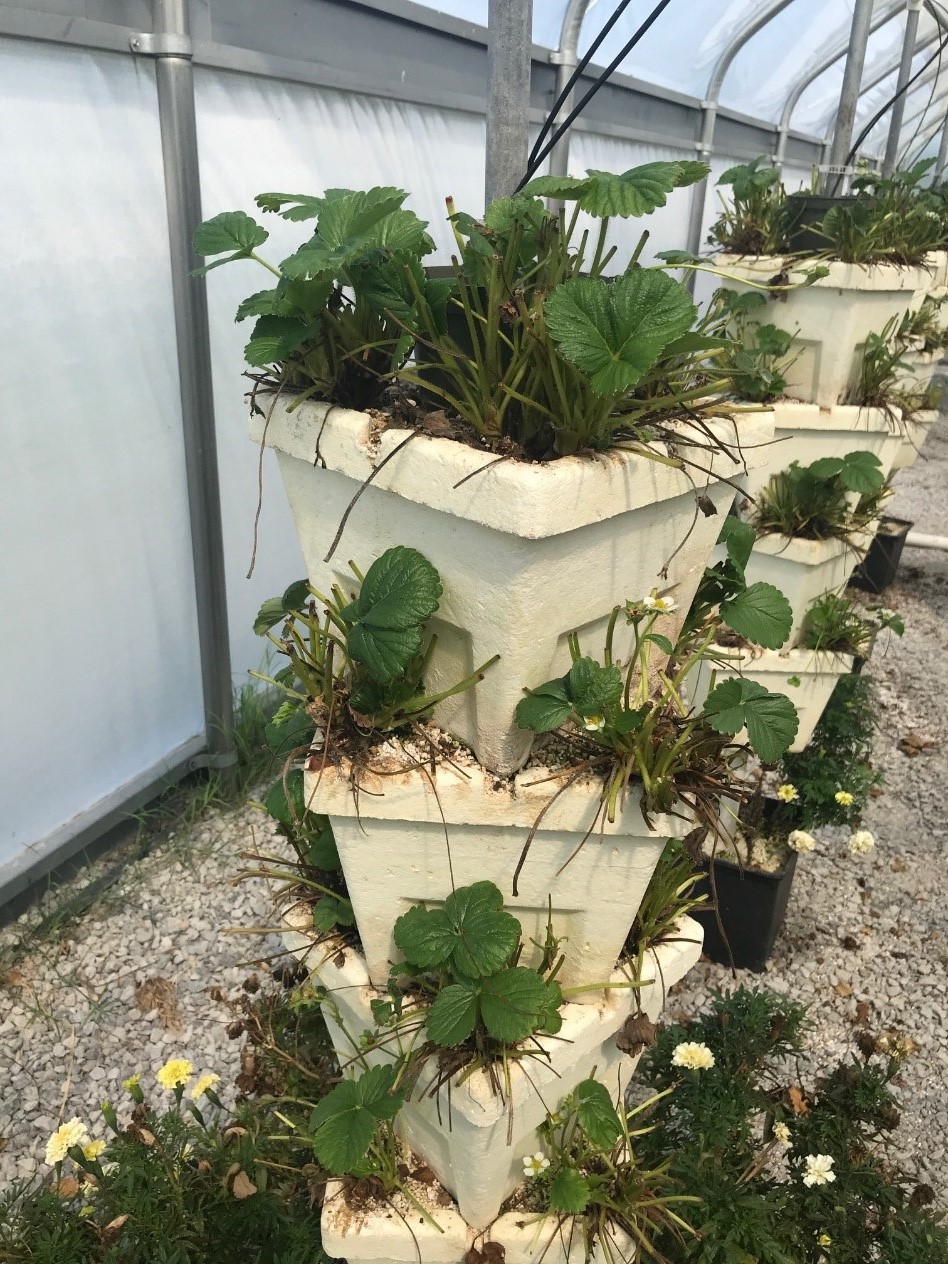
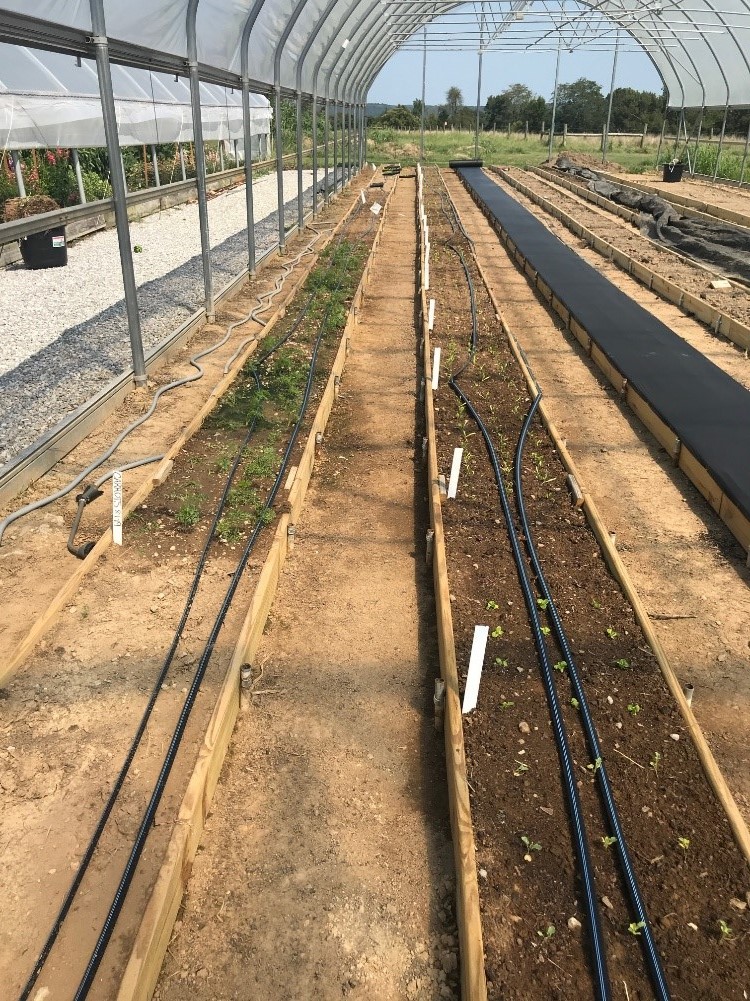
Strawberry plants growing out after they have been trimmed and thinned in hydroponic high tunnel at DSAC (left); high tunnel winter vegetable production plots being established at DSAC. Photos by B. Aly.
Bronwyn Aly (618-382-2662; baly@illinois.edu)
Fruit and Vegetable Pest Management
New Videos on Late Season Insect Scouting and Fruit Set in Pumpkins
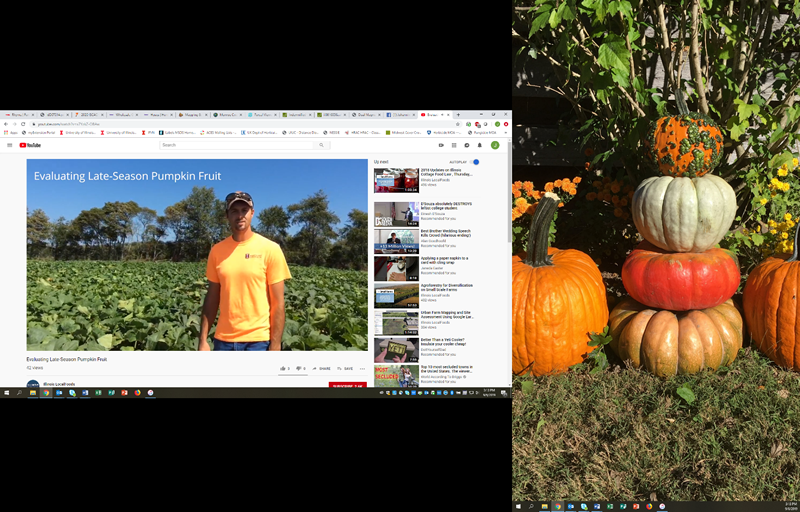
Recently, we have posted two new, short videos on our Local Food Systems and Small Farms YouTube Channel addressing late season insect scouting and how to evaluate late season pumpkin fruit set. Remember that in addition to these videos, we have many webinars and other video clips on production recorded there. Check it out!
Late Season Insect Scouting in Pumpkins
https://www.youtube.com/watch?v=4aHZX3nFUI0
Evaluating Late Season Pumpkin Fruit Set
https://www.youtube.com/watch?v=s7YzkZ-OBAw
Nathan Johanning (618-939-3434; njohann@illinois.edu)
Reminder - Expanded Indemnified 24(c) Special Local Need Label for Dual Magnum for Illinois Growers Includes Use under Plastic in Strawberries
The Dual Magnum indemnified 24c label is available through www.farmassist.com for growers and applicators to access and download. Be advised that with an indemnified label, you assume all risk of crop injury, crop yield reduction and crop loss. In addition to the indemnified label for over-the-top application in pumpkins, the indemnified label now includes use on Asparagus, Garlic, Leek, Green Onion, Transplanted Bell and Non-Bell Pepper, Transplanted Broccoli, Highbush Blueberry, Elderberry, Blackberry, Red and Black Raspberry, Carrot, Cucumber, Broccoli, Chinese Cabbage, Collards, Kale, Mustard Greens, Turnip Greens, Cabbage, Transplanted Eggplant, Garden Beet, Parsnip, Radish, Turnip, Rutabaga, Muskmelon, Cantaloupe, Watermelon, Okra, Dry Bulb Onion, Spinach, Swiss Chard, Winter Squash, Sweet Potato, Summer Squash, and Strawberry. The Devrinol label also has allowance for use under plastic in strawberries, but Dual Magnum has a bit better efficacy against nutsedge. So if you haven’t laid your plastic for annual strawberries, consider Dual Magnum.
Go to www.syngenta-us.com to get the label. Click on the heading “Crop Protection,” then select “Indemnified Labels” from the lists that pops up. If you are not a registered user, you will need to go through the registration process before getting access to the label. Once registered, go back to the indemnified labels and log in. Select “Illinois” as your state, and “Dual Magnum” as your product, then submit. Scroll down and select your crop. Read the liability waiver before signing off by clicking “I Accept.” At this point, you have access to the label and can save and/or print a copy for your use. You must have it in your possession for use.
Elizabeth Wahle (618-344-4230; wahle@illinois.edu)
Less Seriously
https://www.bydewey.com/pun.html
1. The fattest knight at King Arthur's round table was Sir Cumference. He acquired his size from too much pi.
2. I thought I saw an eye doctor on an Alaskan island, but it turned out to be an optical Aleutian.
3. She was only a whiskey maker, but he loved her still.
4. A rubber band pistol was confiscated from algebra class, because it was a weapon of math disruption.
5. No matter how much you push the envelope, it'll still be stationery.
6. A dog gave birth to puppies near the road and was cited for littering.
7. A grenade thrown into a kitchen in France would result in Linoleum Blownapart.
8. Two silk worms had a race. They ended up in a tie.
9. A hole has been found in the nudist camp wall. The police are looking into it.
10. Time flies like an arrow. Fruit flies like a banana.
11. The paradox of our time in history is that we have taller buildings, but shorter tempers; wider freeways, but narrower viewpoints; we spend more, but have less; we buy more, but enjoy it less. ~ Dr. Bob Moorehead. See Words Aptly Spoken and The Paradox of Our Time.
12. Why do we have noses that run and feet that smell? ~ Unknown.
13. There was the person who sent ten puns to friends with the hope that at least one of the puns would make them laugh. No pun in ten did.
14. If you jumped off the bridge in Paris, you'd be in Seine.
15. The midget fortune-teller who escaped from prison was a small medium at large.
16. The soldier who survived mustard gas and pepper spray is now a seasoned veteran.
17. A backward poet writes inverse.
18. In a democracy, it's your vote that counts. In feudalism, it's your Count that votes.
19. The quickest way to get someone's attention is to no longer want it. ~ Anonymous.
20. An intellectual says a simple thing in a hard way. An artist says a hard thing in a simple way. ~ Charles Bukowski.
21. Nothing haunts us like the things we don't say. ~ Mitch Albom.
22. Advice is what we ask for when we already know the answer but wish we didn't. ~ Erica Jong.
23. Laughing at our mistakes can lengthen our own life. Laughing at someone else's can shorten it. ~ Cullen Hightower.
24. We are what we repeatedly do; excellence, then, is not an act but a habit. ~ Aristotle.
25. Work for a cause, not for applause.
Live life to express, not to impress.
Don't strive to make your presence noticed, just make your absence felt. ~ Unknown.
University of Illinois Extension Specialists in Fruit and Vegetable Production & Pest Management
Extension Educators – Local Food Systems and Small Farms |
||
Bronwyn Aly, Gallatin, Hamilton, Hardin, Pope, Saline, and White counties |
618-382-2662 |
|
Katie Bell, Franklin, Jackson, Perry, Randolph, & Williamson counties |
618-687-1727 |
|
Sarah Farley, Lake & McHenry counties |
847-223-8627 |
|
Nick Frillman, Woodford, Livingston, & McLean counties |
309-663-8306 |
|
Laurie George, Bond, Clinton, Jefferson, Marion, & Washington counties |
618-548-1446 |
|
Zachary Grant, Cook County | 708-679-6889 | |
Doug Gucker, DeWitt, Macon, and Piatt counties |
217-877-6042 |
|
Erin Harper, Champaign, Ford, Iroquois, and Vermillion counties |
217-333-7672 |
|
Grace Margherio, Jackie Joyner-Kersee Center, St. Clair County |
217-244-3547 |
|
Grant McCarty, Jo Daviess, Stephenson, and Winnebago counties |
815-235-4125 |
|
Katie Parker, Adams, Brown, Hancock, Pike and Schuyler counties |
217-223-8380 |
|
Kathryn Pereira, Cook County |
773-233-2900 |
|
James Theuri, Grundy, Kankakee, and Will counties |
815-933-8337 |
|
Extension Educators – Horticulture |
||
Chris Enroth, Henderson, Knox, McDonough, and Warren counties |
309-837-3939 |
|
Richard Hentschel, DuPage, Kane, and Kendall counties |
630-584-6166 |
|
Andrew Holsinger, Christian, Jersey, Macoupin, & Montgomery counties |
217-532-3941 |
|
Extension Educators - Commercial Agriculture |
||
Elizabeth Wahle, Fruit & Vegetable Production |
618-344-4230 |
|
Nathan Johanning, Madison, Monroe & St. Clair counties |
618-939-3434 |
|
Campus-based Extension Specialists |
||
Kacie Athey, Entomology |
217-244-9916 |
|
Mohammad Babadoost, Plant Pathology |
217-333-1523 |
|